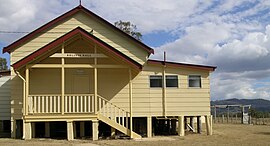Bolivia, New South Wales
|
Bolivia New South Wales |
|
|---|---|

Bolivia Hall with Bolivia Hill in the background
|
|
| Coordinates | 29°18′S 151°57′E / 29.300°S 151.950°ECoordinates: 29°18′S 151°57′E / 29.300°S 151.950°E |
| Postcode(s) | 2372 |
| Elevation | 830 m (2,723 ft) |
| Location |
|
| LGA(s) | Tenterfield Shire |
| County | Clive County |
| State electorate(s) | Lismore |
| Federal Division(s) | New England |
Bolivia is a locality on the Northern Tablelands in the New England region of New South Wales, Australia. The remains of the settlement comprises the former Bolivia Hotel, a disused post office, a disused railway siding and a community hall.
The area where Bolivia was established is the territory of the Ngarabal people. In the Ngarabal language, the area is known as Bilba, meaning big bushes. This area has continued to remain significant to Ngarabal people since European settlement, containing significant sacred sites and ceremony grounds. There are records of 300 Aboriginal people taking part in a corroboree there in the 1870s.
The first European settlement was in 1840, with the establishment of a sheep station owned by a squatter named Edward Hurry. Hurry had previously spent some years in Bolivia in South America, and chose this name for the land around his property. Hurry's sheep contracted catarrah and he sold Bolivia to Sir Stuart Donaldson who then held the property until 1843.
During the 1840s, Bolivia was bought by Edward Irby. There was fierce Ngarabal resistance to Irby's incursion into their traditional territory, culminating in numerous expeditions led by Irby, together with Thomas Windeyer and his servants, Connor and Weaving, seeking retaliation against Ngarabal killings of men associated with their land holdings. Irby's memoirs record that on one of these expeditions, in 1842, they "routed" around 100 Aboriginal people, burning their camp and all of their property. On another, on October 17, 1844, Irby recounts that he and the men "punish(ed) severely" a group of Aboriginal people hiding in the rocks who they held responsible for the killing of one of their men.
During the 1880s a township developed towards the foot of Bolivia Hill as the railway was extended through the area. The town supported two bakeries, two butchers, two general stores, a produce store, a post and telegraph office and the railway offices, workshop and stables etc. The first school opened in 1883 and closed in 1886. Several other schools opened later and one was operating up until November 1966. Bolivia Post Office opened on 30 April 1883 and closed in 1982.
In 1981 the name Bolivia was assigned to the region covered by the various farms comprising Hurry's original estate, and is now an address locality for the farming properties scattered to the north and northeast of Deepwater.
...
Wikipedia

